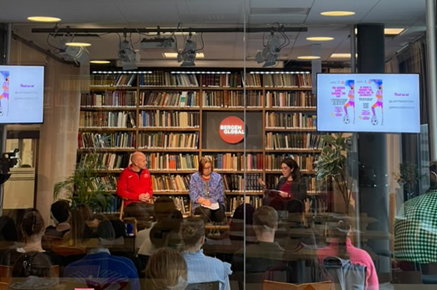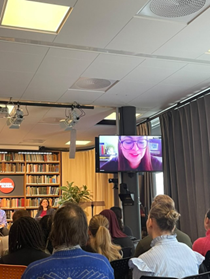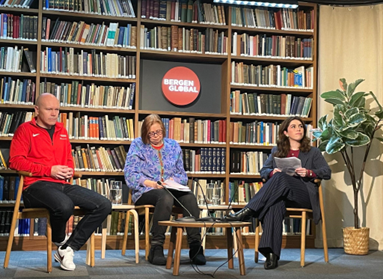The Gender Game: Closing the Gap
On Thursday, March 6th, there was a full house at Bergen Global, where people gathered to talk about the barriers that women still face to access the labour market in 2025, and the gender pay gap.

Photographs taken by Cecilie Grankel, John Alstad and Sofie Ægidius.
This event was organized to commemorate International Women’s Day and highlight the issues that need to be discussed to improve the world of work and close the gender gap. The event held by Law Transform and Minojur Bergen featured international consultants, professors, and football industry experts. The event had the participation of Tine Eidsvaag (Professor and Researcher at the LaW-BALANCE project of the University of Bergen), Juliana Acero Morad (International Employment and Social Security Law Consultant and Director of the Labor Law Department and the Labor Observatory at Javeriana University), Lars Johan Myklebust (Sportslig Leder - Kvinner. Brann Football Club), and ELSA Bergen represented by Elise Margrete Weltzien.


Through the planning of the event there was an open invitation for everyone to participate in a special activity: nominating a woman that sparked admiration. The purpose of this activity was to share their stories and celebrate them at the event. On Women's Day, it is important to commemorate the efforts and struggles that women have faced throughout history. By reflecting on their achievements, it is possible to celebrate how far society has come and recognize the challenges that still lie ahead. Often, it is easy to only think of major milestones, but everyday actions and the women around us play an important role in shaping the path forward. Their contributions, big and small, are equally valuable in building a better future. The planning committee received answers from Norway, Switzerland, Denmark, Sudan, Colombia, Brazil, China and France, among others. Each attendee received one story as a welcome gift to the event. The aforementioned, as a message and reflection of how powerful everyone can be in the local communities and the world.
The conversation was rich and allowed us to join diverse perspectives on the issue at hand. The main lessons learned from the event are:
- As viewers of football, we play an important role in guaranteeing that the women who are playing professional sports get adequate working conditions. For this reason, it is fundamental that we support our local teams by going to matches, reading about them online and following their social media. Our power as consumers should not be underestimated!
- It was shared that girls that play football at a young age are prone to taking on leadership roles later in their careers. Therefore, we must continue advocating so little girls can dream about playing football and taking on traditionally male dominated arenas.
- Women around the world face different challenges and the situation in the EU and EEA differs from the one in Latin America. At the EU level it is required that more protections against unfair dismissals are put in place. On the other hand, in Latin America, we need maternity and paternity leave to be proportional, so that employers do not perceive women to be a more expensive workforce.
- It is important to promote more affiliations to unions in Latin America and allow for more female leadership that promotes feminist agendas.
In addition, some of the inspiring stories of women that were shared are:

The name of the person who shared this story: Ney. The woman that inspires her is: Her Grandmother, Mame Madior Boye. Why she is special to her: She is a woman I deeply admire for her strength and leadership. As the first female Prime Minister of Senegal, she fought for women's rights and justice, breaking barriers in politics. She was also a key feminist figure in the 1990s and 2000s, inspiring future generations with her dedication to equality.

The name of the person who shared this story: Ianira Vieira. The woman that inspires her is: Carmen Pereira. Why she is special to her: Carmen Pereira was a Bissau-Guinean politician. She served three days as Acting President in 1984, becoming the first woman in this role in Africa and the only one in Guinea-Bissau's history. She was a combatant during the war of independence, a political officer, and a commander at a time when gender equality was still a radical idea in her society.

The name of the person who shared this story: Sofie Æ. The woman that inspires her is: Mom. Why she is special to her: She’s the best—always has my back and supports me in everything I do! She’s the strongest woman I know, balancing several careers while successfully raising twins as a full-time worker. She also has the kindest heart of anyone I know. mat and more.

The name of the person who shared this story: Lynette Lai. The woman that inspires her is: Her name is Serrini Leung, a signer from Hong Kong. Why she is special to her: The feminist concept conveys through her arts, her interviews make me feel empowered as well.
As LawTransform and Minojur Bergen, we thank everyone that participated and made this conversation possible. We hope that we can keep contributing to this important discussion and that we all can continue working to build a more equitable world for everyone.

